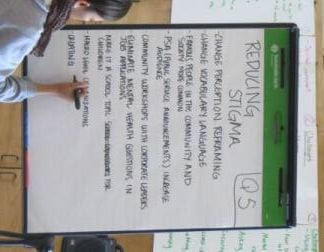By Anthony Barletta (’17)
There is no lack of controversial issues within the City of Harrisonburg and Rockingham County, and even on our campus. But there is a place to discuss them. In 2011, JMU faculty and students in the School of Communication Studies (SCOM) program, created an outlet to create spaces where these issues could be discussed productively.
For the last five years, SCOM’s Institute for Constructive Advocacy and Dialogue (ICAD) has collaborated with both the campus and the community to ease different groups of people into complex discussions.

Unraveling and understanding these public issues is no easy task. Issues that challenge these communities range from mental health disabilities to sexual assault to the recidivism rate. Hitting close to home, community members have difficulty discussing these complex issues.
Engaging diverse groups in productive talk is a collaborative effort headed by ICAD’s director, Dr. Lori Britt and associate director, Dr. Rob Alexander.
ICAD brings community members, JMU faculty, and JMU students together in these discussions. According to Dr. Lori Britt, the talk “is not always about finding solutions but is sometimes focused on creating spaces where people can gain others’ perspectives.” As Dr. Britt explains, encompassing different perspectives helps strengthen community relations on campus, in the community and between the two.
Building a connection between the local residents and JMU affiliates helps develop a positive relationship among these groups. Dr. Britt attributes this growing relationship to the accessibility of the ICAD program, along with its counterpart program 4C.
While ICAD is the umbrella program for supporting community conversations, the Campus Community Civic Collaborative (4C) helps support the process by engaging students as facilitators. Students who wish to facilitate are required to take SCOM 447: Facilitating Public Engagement Processes with Dr. Britt.
 Community members also have an opportunity to become facilitators by attending ICAD training sessions. JMU holds this training once a year but everyone can participate in the facilitated discussions.
Community members also have an opportunity to become facilitators by attending ICAD training sessions. JMU holds this training once a year but everyone can participate in the facilitated discussions.
ICAD and 4C have earned an exceptional reputation in the Harrisonburg and Rockingham Community and are seen as a vital resource to many community groups and organizations. On campus groups and departments also seek out ICAD; the Justice Studies Department, School of Public and International Affairs, and Student Affairs have sought help from ICAD/4C to discuss issues.
In August 2015, 4C held a program that focused on the recidivism rate within the community. This session involved over 90 participants who jointly collaborated, broke down into smaller groups, and then came back together to discuss this issue.
The process of breaking down in small groups, then reconvening as a whole, allows people a chance to share their perspectives and ideas and contributes to a more complete view of complex issues. According to Dr. Britt, “encouraging people to explore their differences and their commonalities contributes to understanding and generating solutions a community can support.”
Another highly successful discussion, held in October 2015, focused on the film documentary ‘The Hunting Ground’. The film depicts responses to sexual assault crimes on college campuses.
This film, watched by students, staff and faculty, was followed by a group discussion led by 4C student affiliates on how they can each play a role in ensuring campuses are safe and socially just.
Looking towards the future, ICAD and 4C plan to continue their ongoing mission of facilitating complex discussions about equally complex local issues.
Over the last five years ICAD’s 28 discussions have propelled the program forward. With this momentum, both ICAD and 4C anticipate helping the Harrisonburg-Rockingham community for years to come.


Leave a comment